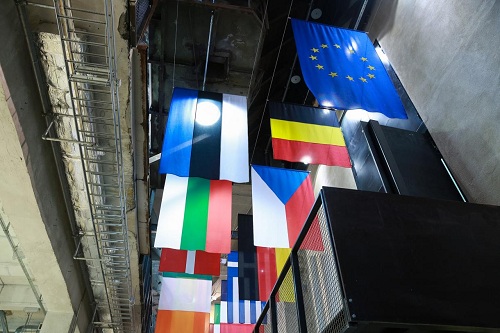
EU2017EE official opening concert performances at Tallinn Creative Hub, June 29, 2017. Photo: eu2017.ee
Estonian Presidency of the Council of the European Union “will focus on advancing the Eastern Partnership agenda,” the Estonian Foreign Ministry told Civil.ge on July 11.
Estonia, which assumed the rotating six-month Presidency on July 1, “would like to keep the ambitious Eastern Partnership in the focus of the EU,” and will support democratic and economic reforms “to bring the Eastern partners closer to the EU.”
“Eastern Partnership enables to uphold a fundamental principle of European security order: the right of countries to choose their own future, their own path to development,” the Foreign Ministry noted, adding that it “is the more important in terms of current security situation in the European neighborhood [when] some partners are still facing aggression or violation of their territorial integrity.”
Speaking on the Presidency’s concrete plans targeting the Eastern Partnership countries, the Estonian Foreign Ministry said that the country will “pay particular attention to sustainable public sector reforms of the partner countries, the development of transport and energy connections, digital society, entrepreneurship and civil society, as well as people-to-people contacts.”
“Estonia fully supports the further political association and economic integration of Georgia, Ukraine and the Republic of Moldova with the EU and the implementation of association agreements,” and sees “opportunities for further developing relations with Armenia, Azerbaijan and Belarus.”
The Ministry also stressed the importance of European Union’s “continued focus on conflict resolution in the Eastern neighborhood,” and added that it will “seek the commitment of the partner countries to fight cybercrime more effectively and to undertake reforms to fight corruption.”
Georgia in the Estonian Priorities
The Foreign Ministry spoke specifically on Georgia as well, saying that the country’s “track of political and economic integration and approximation of the European Union laws has been impressive,” and that it marks EU’s “enhanced and wide-ranging partnership” with Georgia.
“By signing the Association Agreement and the Deep and Comprehensive Free Trade Agreement (DCFTA) in June 2014, relations between EU and Georgia were brought on a new level,” the Ministry said.
“Georgia is committed to political association and economic integration by implementing time-consuming and unpopular reforms,” it also noted, adding that the country “is benefiting from DCFTA economically: trade with the EU is growing, and today, EU is Georgia’s main trading partner.”
The Foreign Ministry also touched upon the introduction of visa free regime to Georgia. “The process was difficult but at the end of the day Georgia proved its quality with successful reforms. Visa freedom is not only about traveling; it has more symbolic value being accepted to European family,” it stated.
In the words of the Foreign Ministry, Georgia is “an outstanding example in implementing reforms in many other areas as well,” which shows that the EU “approaching each partner differently helps to increase the sense of ownership over the reform process.” “With more reforms, there will be more cooperation possibilities; this in turn works as a motivation for further reforms, as Georgia adjusts national legislation to the EU standards,” the Ministry said.
This post is also available in: ქართული (Georgian) Русский (Russian)
